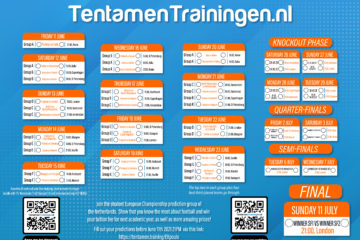Many, if not all students see studying as a dreadful task. It influences the time they have to socialize, and it becomes stressful for them. How you approach studying can help you to find balance between the two. Here are 7 tips to study efficiently, while keeping your stress level low.
1. Take Useful Notes
It is generally known that taking notes helps to retain information; but where do you take notes on? To study efficiently and take more useful notes you need to focus on one person during class: the person speaking. Split your note sheet into 3 sections, as shown below. Make notes on the principles and underlying concepts that are being discussed; On the exam, this is guaranteed to appear 9 out of 10 times.

2. Study in Sections
It goes without mentioning that the more time you spend preparing, the better prepared you are. But how do you use your time? To study efficiently, divide your study time into segments; study 30-40 minutes and then do something that relaxes you for 10 minutes. Study 3 hours a week, instead of 12 hours a day. By segmenting your study time, and repeating what you have read, you will retain the information better.
3. Make Priorities
After dividing your study time, it is time to set priorities. Is there a particular topic that is more difficult for you? To study efficiently you start with this topic; as a result this will lower your nervousness. Begin to prepare for your upcoming exam and depending on the amount of material, set a realistic timetable to prepare for the next exam. Is an exam postponed? Use the extra time to once again take a look at the more difficult topics.

4. Prevent Distractions
Setting priorities is important for your life as a student, as well as your life as a professional. Just as in business, sometimes you will have to prioritize studying over socializing and other activities. As usual, being distracted is unavoidable. Try to analyze your behavior when you’re distracted and learn from it. If you have a better idea of what distracts you, you will be able to resist temptations better and study efficiently.
5. Make a Summary
Now that you know what distracts you, you are focused and all set; it is time to write a summary. To study efficiently, take the notes you took and put these together in order of lecture. Wherever you have missed information you can use a book as a side aid. The following things you must keep in mind when writing a summary are:
– Do not rewrite the original piece, use your own wording
– Keep your summary short
When writing a summary about a book, aim to write only about 20% the volume of the source. In addition, write it in your own words, in a way which you will understand. After you have written it, find the keywords and highlight them to make them standout. If important information is better explained with either a diagram or a model, include it in your summary.
Another way of writing a summary is to write down the keywords per chapter. You could describe a word like ‘Marketing’ with sub-meanings and definitions, like shown in the document. This will make the material easier to understand. Some keywords are related to each other, therefore, focus on the interrelation between them to understand the material better.

6. Practice Questions
Once your summary has been made, read it once or twice thoroughly. Do you think you understand it? The only way to find out is to practice what you have learned. A good way to do this is to make flashcards by using a tool like ProProfs, to see if you know and understand what you have read. However, we have noticed that the topics of questions are often similar to the previous ones. Therefore, to study efficiently take a look through our database of exam questions.
7. Use Our Platform
Up until this point, you have been on your own. We would advise that the last thing you do, is to look through what other students have made and see if you missed anything. Whether it is lecture notes, summaries or past exams, there is always something that will help you with your final preparations. You don’t have an account? Click here to sign up, it’s free.
Resources
There are a lot more resources out there that will help you along the way. We have provided you with a few resources below specific to each tip that we have discussed before. Aside from these, here are the resources we most recommend you to take a look at:
QS Top Universities | On their website, you will find a lot of general information on how to prepare yourself for your exam.
ECPI University | They provide a lot of in-depth articles on a variety of jobs in the field, as well as tips to help you study efficiently.
TranscribeMe | On their website you will read about how to use their technology to reduce stress and save time and energy.
Take Useful Notes
MIT Library | Learn how apps can help you to study efficiently by allowing you to take notes while writing, drawing or speaking.
University Herald | Learn why taking notes the old-fashioned way is more beneficial and helps you study efficiently.
eNotes | Learn how to enhance your notes by using outlines and color coding in order to study efficiently.
Study in Sections
Oxbridge Academy | Learn how to segment your break, based on your own personality.
Make Priorities
Vandelay Design | Learn how you can prioritize tasks to study efficiently.
Scoro | Learn priority-setting tactics with 3 methods that will help you to study efficiently.
The Balance | Learn how to start from square one; making a to-do list, which will work.
Prevent Distractions
SkilledUp | Learn how to avoid distractions by finding the right place to study.
About Education | Learn how to avoid distractions while anticipating on physical needs.
Cal Poly | Learn how you can study efficiently with tips on how to avoid distractions and increase your concentration.
Make a Summary
Kibin | Learn the importance of paraphrasing while writing a summary.
EduBirdie | Learn how to write a research summary with structure.
EssayPlus | Learn how to write an essay.
Practice Questions
ProProfs | Make your own Flashcards or practice the ones made by others on a lot of different topics.
GoConqr | Learn how to create your own quiz to test your understanding of the material.
Quizlet | A combination of the 2 resources above, allowing you to create both flashcards and quizzes.


